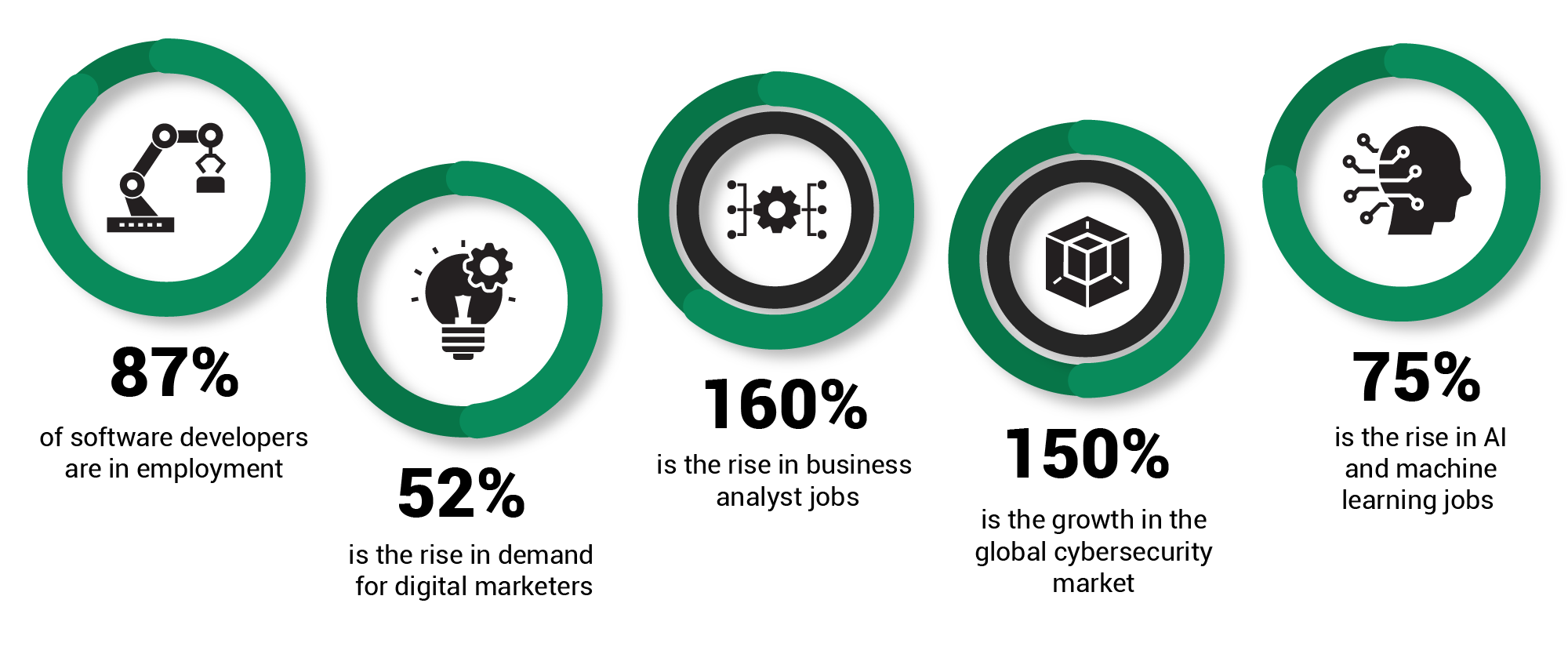The COVID-19 pandemic imposed a set of new challenges for companies of all sizes all across the world. While governments imposed various degrees of lockdowns to combat the virus, employers were forced to adapt to the concept of remote work, and working from home.
Although both employers and workers had their doubts, the past year has shown how effective remote working can be.
Not only are many employees often more motivated to prove their engagement than they are when they’re at the office, they get to save on commute time and expense while companies can also achieve savings on office overheads whilst still achieving their targets.
More importantly, companies started realizing they ought to consider talent wherever the talent exists regardless of physical location.
The COVID catalyst has illuminated the fact that, with the right communication tools and skills, it doesn’t matter where employees work from.
Remote work has cemented its place in the long-term plans of employers around the world, with video conferencing, and virtual collaborations becoming an established part of everyday business life.

Business Process Outsourcing (BPO) in the Philippines
This industry is critical to the Philippines’ developing economy, employing more than 1.3 million employees working from home. And with an annual growth of nearly 10% each year, BPO is tomorrow’s big deal.
But the BPO sector itself is not static. The kind of roles that were outsourced years ago, such as call center staff and transcription services, are being replaced by technology-driven solutions which are automating repetitive jobs.
The BPO industry in the Philippines now needs to turn towards more specialized talent, providing a bespoke high-end service solution to global companies.
So how do you, as a worker, tap into this increasing pool of remote work opportunities? Well, the first step is to identify the kind of roles that will be in high demand years into the future.
The second step? To equip yourself with the skills you need to be a rising talent in that field.
Top 8 in-demand US remote working roles
Although more than half of companies worldwide operate a form of outsourcing, by far the greatest pool of clientele for BPOs is American businesses.
And while administrative and call center roles for communications and real estate companies take up a large percentage of today’s market, the same won’t be true in the years to come.
So whether you’re a student deciding what courses to take in college or an employee looking to diversify, enhancing your skill set to match future needs of these companies is a great career move. Here we look at the top BPO roles that American companies will be looking for tomorrow.

1. Software Development
As the world becomes increasingly connected, the demand for new and engaging software is increasing exponentially.
From Java development for business applications to UX/UI design for customer-facing software, the positions available in the field of software development is growing and in fact the employment rate amongst software developers currently sits at 87% in the US alone.
These roles require a good understanding of the company’s objectives, but without any need for the employee to be present in the workplace. This makes software design one of the most sought-after remote working roles of the decade.
2. Digital marketing
The global lockdowns in 2020 triggered unprecedented growth in e-commerce and online sales. Hand-in-hand with this comes an increased demand for digital marketing managers to handle the full range of online product sales.
Jobs in digital marketing were some of the fastest growing in the UK last year across any sector, according to LinkedIn, which shows a 52% rise in demand for such roles.
Whether your specialty is in social media advertising, search engine optimization (SEO), or sales video production, the remote working community in this field is booming.
3. Business Analytics
Not long ago, statisticians were considered nerdy. But with billions of megabytes of data being created every second, workers who can harness those figures to guide data-driven decision making (DDDM) are in high demand.
Amazon says this is one of the fastest-growing highly-skilled jobs over the past five years. Based on its own data, business analyst jobs increased by 160 percent.
If you have a flair for mathematics, then getting a handle on big data could be your ticket to offering high-value services to an overseas business.
4. Cybersecurity
With technology infiltrating every aspect of our lives, there is an increased demand for security to protect the data and transactions that are carried out in the virtual domain.
The global cybersecurity market is predicted to expand by 150% over the next ten years. Very few companies have this skillset within their staff, and as in-country prices for cybersecurity services soar, more and more businesses are looking offshore for solutions.
5. Financial Management
Small and medium enterprises are increasingly outsourcing their financial management, and it’s easy to see why. The process of preparing financial reports, budget handling, and profit projections is a time-consuming and specialist task.
Add to that the legal compliance aspect – sometimes spanning several countries – and it’s no wonder that companies would rather outsource this work to a specialist team.
6. Artificial Intelligence
While AI looks set to reduce demand for repetitive, low-skill work, the field also creates several remote working opportunities.
Programming these automated systems is becoming a high-demand role. AI and machine learning jobs have jumped by almost 75% over the past four years and poised to keep growing.
Because the field is changing so rapidly, short courses that give you both the foundations and an up-to-date handle on the current landscape are more influential than your existing university degree.
7. Human Resources
By selectively outsourcing their HR processes, businesses can reap the benefits of professional-level recruitment, onboarding, and payroll without investing in a specialist in-house.
This is more cost-effective for the company and often provides a better experience for the employee. Philippine BPOs are a key provider of offshore HR processes to US companies.
8. Blockchain Development
A newcomer to the job market in the last couple of years, this specialty combining economics, programming, and cybersecurity is one of the most sought-after talents of 2021.
Because the field is somewhat in its infancy, the competition for jobs is currently low, and demand for these skills is set to increase over the coming years.

Why is the Philippines the country of choice for remote workers?
By its very nature, remote work is not location-specific. So why is it that US companies look to the Philippines for the benefit of business process outsourcing? We break it down into five key reasons:
1. Language
Employers from English-speaking countries look for English-speaking staff. As well as improving the customer experience in front-office roles, English fluency reduces the risk of misunderstandings in back-office roles.
The Philippines ranks high in the EF English Proficiency Index, with up to 90% of Filipinos speaking US English to a good standard.
2. Culture
Filipinos are regarded for being trustworthy, optimistic, and hard workers. They are committed to providing the best service they can to their employers.
This global reputation has earned the trust of overseas businesses looking to outsource their company’s processes to a reliable team.
3. Work From Home
While workers around the world have had to adapt to working remotely, Filipinos have a head start. The BPO industry has seen Filipino employees work remotely for a number of years, and the country is well set up with internet infrastructure.
More than 90% of Filipino professionals report that their productivity at home is as high if not higher than in the office – not to mention skipping the commute!
As the future of work becomes increasingly remote, the Philippines is well-positioned to take a lead in this market.
4. Low Cost of Living
With the relatively lower cost of living in the Philippines compared to the West, companies are able to offer fair pay for professional work whilst keeping their costs competitive.
Preparing for the future of work, remotely
To keep ahead of the curve, Filipinos can equip themselves with the skills they need to fulfil the needs of tomorrow’s client.
This opens the doors to specialist roles within BPOs, as well as direct freelancing opportunities with select clients.
But which skills are worth investing in long-term? The skill gaps can be split into two groups: technological, and cognitive.
Technological Up-skilling
Digital Skills
There is no doubt that digitalization is everywhere, and remote workers need to keep their digital skills up to date. But this field offers more opportunity than simple computing. Up-skilling in Robotic Process Automation (RPA), artificial intelligence, cloud computing, or cybersecurity will give you an edge over other candidates for your next remote role.
Data Analysis Skills
Data processing and analysis is key for effective business processes, affecting fields from health science to marketing. By up-skilling their data analysis skills, Filipinos can capture the market for outsourcing these fundamental business processes.
Cognitive Up-skilling
Decision-Making Skills
Gone are the days of a dominant CEO single-handedly making decisions that drive the company. Increasingly, employers are hiring consultants to interpret their big data and help inform their decision making at every level of the organization. Data-driven decision making is a skill in short supply, and a valuable feather in your hat.
Continuous Learning Skills
As Heraclitus noted, over 2,500 years ago, “The only constant is change” – an adage that is as true today as it ever was. As the technology we work with changes and evolves in a matter of hours, one of the best skills you can invest in is your own ability to learn. Soft skills such as problem solving, collaboration and initiative provide you with a good foundation as you keep up with our rapidly changing environment.

The Bottom Line
Nexford can help prepare you for this ever-changing world with modern degrees, specialization courses and certificates that include hands-on projects and real business case studies to prepare you for pretty much all eventualities taking place in a shifting business landscape.
Develop a roadmap for digital transformation, understand how to build a tech startup, learn to prepare for and take advantage of AI and automation, and discover how to apply various analytics modelling and visualization techniques for better business decision making.
Nexford’s MBA allows you to apply big-picture themes that are shaping global business, such as digital marketing, supply chain management and business process outsourcing, to help advance your career or business.
This affordable and accredited master’s degree, split across specializations that include Sustainability, International Business, Enabling E-commerce, Advanced AI, and Cybersecurity, will help you gain the skills to succeed in fast-moving global environments.
Not ready for a degree? Nexford offers are a range of certificates that will allow you to future-proof your career with skills for today that are relevant to the job market of tomorrow and beyond.
Certificates in Business Analytics, AI and the Future of Automation, and 360 Degree Marketing, to name a few, will enable you to succeed in today’s most in-demand fields. Add key skills to your career toolkit — in just 6 months or less.
Subscribe to our newsletter
Don't miss out on our latest updates.
Unlock Your Potential: Explore Our Programs
Invest in yourself and your future. Discover our range of degrees, courses, and certificates to achieve your goal







